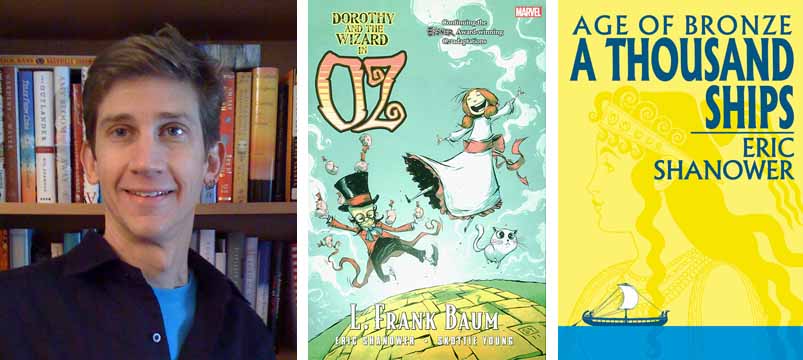Eric Shanower is the Eisner Award-winning cartoonist of the graphic novel series ‘Age of Bronze’ (Image Comics), a retelling of the Trojan War story. With cartoonist Skottie Young, he is adapting L. Frank Baum’s classic Oz books to award-winning, New York Times best selling graphic novels (Marvel Comics). Shanower’s past comics work includes his own Oz graphic novel series, currently published as ‘Little Adventures in Oz’ (IDW), as well as comics art for ‘An Accidental Death’ by Ed Brubaker, ‘The Elsewhere Prince’ by Moebius and R-JM Lofficier, and ‘Harlan Ellison’s Dream Corridor’. He has illustrated for television, magazines, and children’s books. He’s the author of ‘The Giant Garden of Oz’ and ‘The Salt Sorcerer of Oz and Other Stories’. He lives in San Diego, California, with his partner, David Maxine, and a cat.
Although busy preparing for his appearance at San Diego Comic-Con, Eric has graciously agreed to answer some questions about writing and illustrating.
For what age audience do you write?
Most of the Oz projects that I do, including the series I currently write for Marvel Comics, are Middle Grade. Age of Bronze, my Trojan War comics series, is adult, although for a while it was appearing on Young Adult lists.
Tell us about your latest book.
I’m adapting the Oz books by L. Frank Baum to the comics medium. Skottie Young is the artist for these books and Jean-Francois Beaulieu is the colorist. We’re currently working on the sixth Oz book, ‘The Emerald City of Oz’. These adaptations are very close to the original material. The only changes I make to the stories is to incorporate, when appropriate and useful, other versions by Baum, such as stage scripts and introductions for excerpts. For the earlier books, we didn’t leave anything out, but the publisher has cut our page count, so, particularly for the latest book, we’re having to condense. I’ve been a professional cartoonist for nearly three decades and I’ve loved the Oz books since I was six years old, so I bring a deep knowledge of both the comics medium and Oz to these adaptations. In addition to Skottie Young’s vital new vision of Oz, which many readers seem to love overwhelmingly, I think this strength gives this series of books the power to last.
What do you hope readers will get from reading that book?
I hope readers of our comics adaptations of the Oz books get a thrilling and humorous experience that’s fresh and direct.
What aspect of writing or illustrating do you find most challenging?
One of the most challenging aspects of illustrating a comics script that I didn’t write and have little or no emotional connection to. The only way I can get through that situation is to find some aspect of the script that I can relate to, something that has some fundamental meaning in my life. Otherwise, drawing a story I don’t care about is just a mechanical slog to get through.
Henry: I’m tempted to ask to what aspects of The Wonderful Wizard of Oz you can personally relate 🙂
What is a powerful lesson you’ve learned from being a writer?
A powerful lesson I’ve learned is that anger can be a strong motivational tool to keep a project going.
Henry: Yes, anger. Anger and deadlines.
What has been a memorable experience that you never would have had if you had not been a writer/illustrator?
I might never have gone to the site of Troy if I weren’t producing a comics retelling of the Trojan War story. I spent twelve days there and in the surrounding area in the summer of 2006, doing onsite research for ‘Age of Bronze’. It was one of the most magnificent experiences I’ve had.
What advice would you give to aspiring authors or illustrators?
Keep writing and drawing. The only way you’ll get better is by practice.
Do you have any favorite quotes?
“There is a word sweeter than mother, home, or heaven. That word is Liberty.” –Matilda Joslyn Gage
Do you have any strange rituals that you observe when you write or illustrate?
Nothing comes to mind. Just getting the work done is the most important thing. Who has time for rituals?
Henry: You’d be surprised. Some writers cannot be productive without their rituals.
If you could have one superpower, what would it be?
Flight, because it seems like it’d be really fun.
If you could have three authors over for dinner, who would it be?
I wouldn’t want any dead people over for dinner. Wouldn’t that be pretty disgusting? But if dead people could be resurrected and returned to a non-decayed state, I’d choose L. Frank Baum, Homer (as long as Homer could somehow magically speak English), and William Shakespeare.
Henry: Well played, sir. Most people forget about language barriers.
What is your favorite creature that exists only in literature?
Gods. Across all cultures, they’re endlessly fascinating.
Henry: Plus, they have superpowers!
What do you like to do when you’re not writing/illustrating?
My hobbies are reading, taking dance classes, and researching my family genealogy.
Henry: For me, genealogy proved surprisingly illuminating and emotional. I found some delightful connections, including being related to children’s literature goddess Madeleine L’Engle.
What would you like it to say on your tombstone?
My name.
Henry: Ah, a purist.
Where can readers find your work?
Readers can find my books in the usual places—online booksellers, book stores, comic book shops. Also my website has a link to an online store where most of my current work is for sale and there are samples to read online. Many of my comics—Age of Bronze and Oz—are available in digital editions, too. I will be at San Diego Comic-Con, booth 2008.
This article is also posted to the San Diego Children’s Books Examiner.

